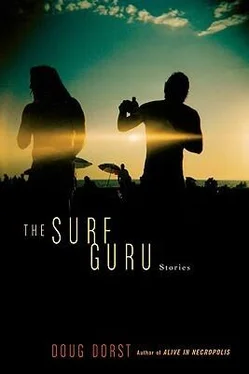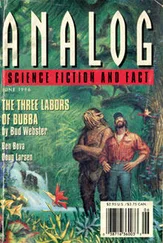Roger, to whom she’d hardly spoken all afternoon, appeared on the patio and blew a four-fingered whistle that stopped the boys in their tracks. “Know what time it is, fellas?” he called out, lifting a huge papier-mâché baseball out of a cardboard box. “It’s piñata time!” He held the ball over his head proudly, and the kids clustered around him as he walked across the grass to the sturdy live oak that grew in the yard. With a short length of rope, he hung the piñata from the tree’s lowest limb.
Kacy seated herself at one of the picnic tables and surveyed the scene. She’d leave soon. Right after the piñata. “I think that’s going to be too high for them,” she called out.
“No, it’s not,” Roger said in a sugary, carefree tone that she knew was meant to rankle her. He looked up at the baseball, and then down at the little people jostling around him. “They can ride on my shoulders.”
“Whatever you say,” she said. She flicked a glob of brown icing off the table and sucked her nail clean.
Roger told Kenny to be polite and let his friends go first, so Kenny just danced in place and sized up the ball with eager eyes. April tied a blindfold on the first boy in line and then handed him a broomstick after Roger hoisted him up on his shoulders. Roger bobbed gently through an orbit around the ball, letting the kid get a few licks in, but never allowing him enough leverage to do more than rock the ball harmlessly. After a few more boys had their turns, Skillet took over piggyback duty, and Kacy was pleased to see that he was following Roger’s lead, rigging the game so the birthday boy could strike the killing blow. When it was Kenny’s turn, April lifted him onto her shoulders. She brought him close to the piñata and stood still, but Kenny missed the ball entirely, slashing wild verticals through the air.
Kacy looked at her watch. It was 4:52. Hit it, Kenny. Why can’t you hit it?
“Level swing, Kenny,” Roger coached. “Focus.”
Kenny hit the ball dead-on. Nothing happened. Twice more, and still nothing happened.
“Hold on,” Roger said. “I have an idea.” He jogged over to Kenny’s pile of presents and picked up the baseball bat he’d given to his son, a gleaming piece of lacquered ash. When he’d brought it home the week before, Kacy had tried to convince him that the bat was too big for Kenny, but he’d waved her off, tied a blue bow around it, and hidden it in their closet. Every time she’d looked at the bat since then she’d been more and more certain that it would break something of hers. It was just a question of when and what and how badly.
Roger slid off the bow and handed the bat to Kenny, who squealed when he felt the heft in his hands.
“I don’t think that’s smart, Roger,” Kacy called, but at the same time she felt herself drifting, disconnecting, her attention captured by the faint but steady chik chik chik of the sprinklers next door watering Mr. Weeks’s garden.
Roger turned to her with his hands on his hips. “It’s fine,” he said. “It’s a baseball bat, for Christ’s sake.”
“My mother says you shouldn’t take the Lord’s name in vain,” a redheaded boy said.
Roger turned to him. “Thank you, Peter,” he said.
At that moment, Kenny swung so hard he lost his balance, and April lurched sideways to keep him from falling off her shoulders. Someone shouted, and Kenny swung again just as Roger turned back to look. The bat caught him squarely in the face. Kacy heard bone crunch. She guessed it was his nose. She’d watched it happen without really seeing it; she’d thought vaguely of shouting a warning, but her mouth felt heavy and slow and it had stayed closed.
April screamed, and Roger fell, his hands clutched to his face. Kenny lifted his blindfold, saw his father bleeding, and burst into tears. Kacy ran to them and took charge. She ordered the boys — including the bawling Kenny — up to the house, where Marisol could watch them. She lifted Roger by the elbow, silently cursing him for getting hurt when the danger was so obvious, and now she’d have to waste hours waiting in a hard plastic chair outside the emergency room and she’d miss Dinaburg and the cake entirely. She had her car keys already in her hand when a better solution struck her. After all, Roger wouldn’t be any worse off if she met him at the hospital later.
“Take your father to the hospital,” she said to April. “I have work to do.” When the stunned faces turned to her, she felt the warm, buzzy lightness that comes with decisions you can never unmake. Blood streamed through Roger’s hands and speckled his sweatshirt and jeans. His eyes on Kacy were calm and lucid, which Kacy thought was remarkable, considering the pain he had to be in. “I warned you,” she said. He shook his head slowly, said nothing, and hiked up the sloping lawn toward the garage, stopping halfway to pick up a crumpled party napkin off the grass and clamp it to his face. From inside the house, Kenny let loose a piercing, frightened wail that Kacy knew would be heard for blocks, and then the screen door slapped open, and Kenny ran outside and launched himself at Roger’s leg, clinging, crying. Kacy watched as Roger knelt and spoke softly to him, wiping one bloody hand dry on his jeans before running it through the boy’s hair.
Kacy looked at April, at her chunky legs and acne-pitted cheeks and the little half-moon of scalp that interrupted her hairline, and she saw the only thing she could save. “Change of plans,” she said. She took the key to the car off her ring and handed it to Skillet. “You drive him, William,” she said. “April, you’re coming with me in the minivan.”
Skillet stood still, the car key resting in his open palm. The key was the same silver color as the piece of metal he’d seen fit to stick through his face. He looked stupefied. Kacy wondered if he was on something.
“We should be with Dad,” April said in the van. “This is fucked. This is so fucked .”
“There’s something I want you to see,” Kacy said, “some people I want you to meet.” She imagined the Dinaburg girl, a pale East Coast beauty, slim and beautiful in a Vera Wang dress, with a torrent of tight, dark, beautiful curls. “And let’s clean up the language.”
The tires squealed as Kacy turned onto South Congress, narrowly beating a red light. April, with the filthy bucket hat clenched in one hand, started running her other hand through her hair, front to back, front to back, front to back, in a perfect, metronomic rhythm. Her eyes were far away. “Don’t worry, honey,” Kacy said as they drove across the bridge. “Everything’s going to be all right. You’ll see.”
They arrived at the Four Seasons at 5:21. Kacy left the van with a valet and hurried into the earth-toned lobby, pulling April along with her. Between two lemon trees in terra-cotta pots, a sign with Dinaburg-Fleischner Wedding in white plastic letters pointed guests to the east wing. They went downstairs, where Kacy knew they’d find the dressing rooms for the wedding parties. She heard Dinaburg’s voice raised high with good cheer and, with a tug on April’s arm, followed it to a half-open door. Dinaburg, wearing a white yarmulke, stood with his back to them, a glass of red wine in his hand. He looked good in his tuxedo, she thought; his shoulders sloped more than she liked, but his butt had a cute little curve to it — not like Roger’s sheer-drop wall of an ass. She caught a glimpse of a long white dress in the far corner of the room. The bride was surrounded by people — one of whom, Kacy guessed, was Dinaburg’s snarly bitch of a wife — but she could tell that the girl was a tiny thing, with porcelain skin and a button nose and thin wrists and the dark curls that Kacy had imagined.
Читать дальше












